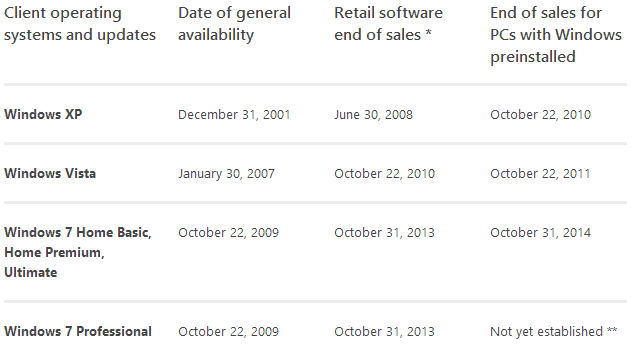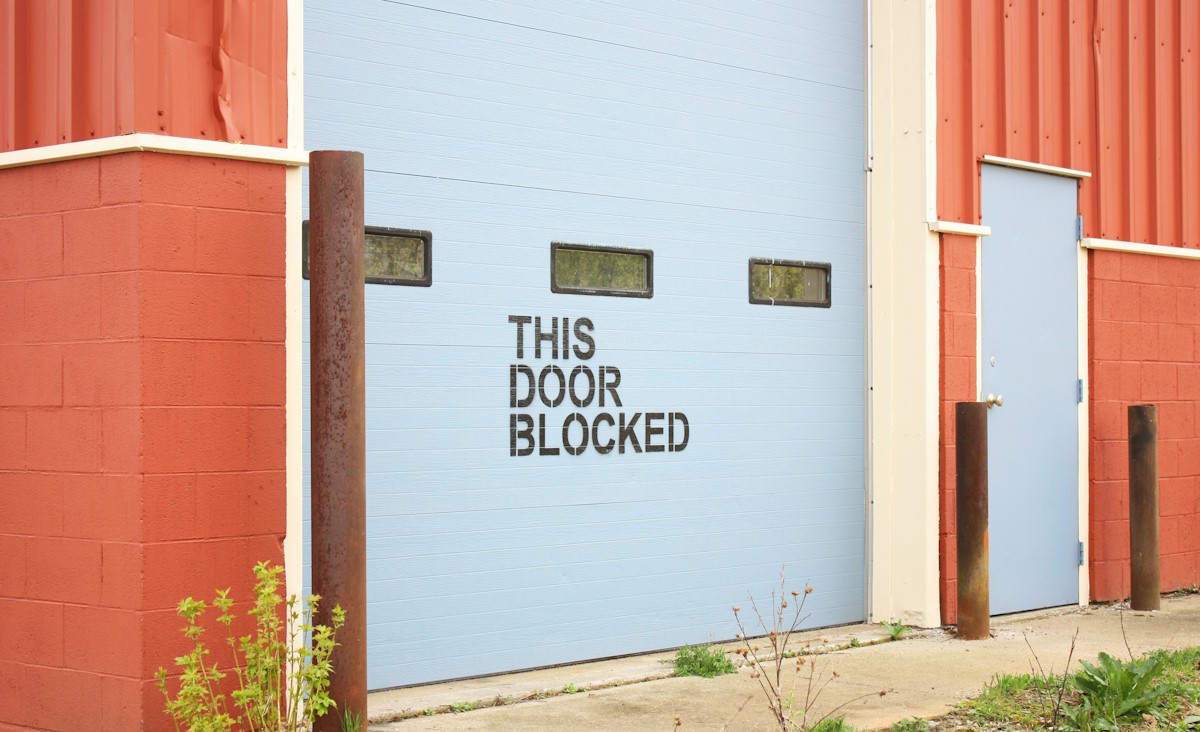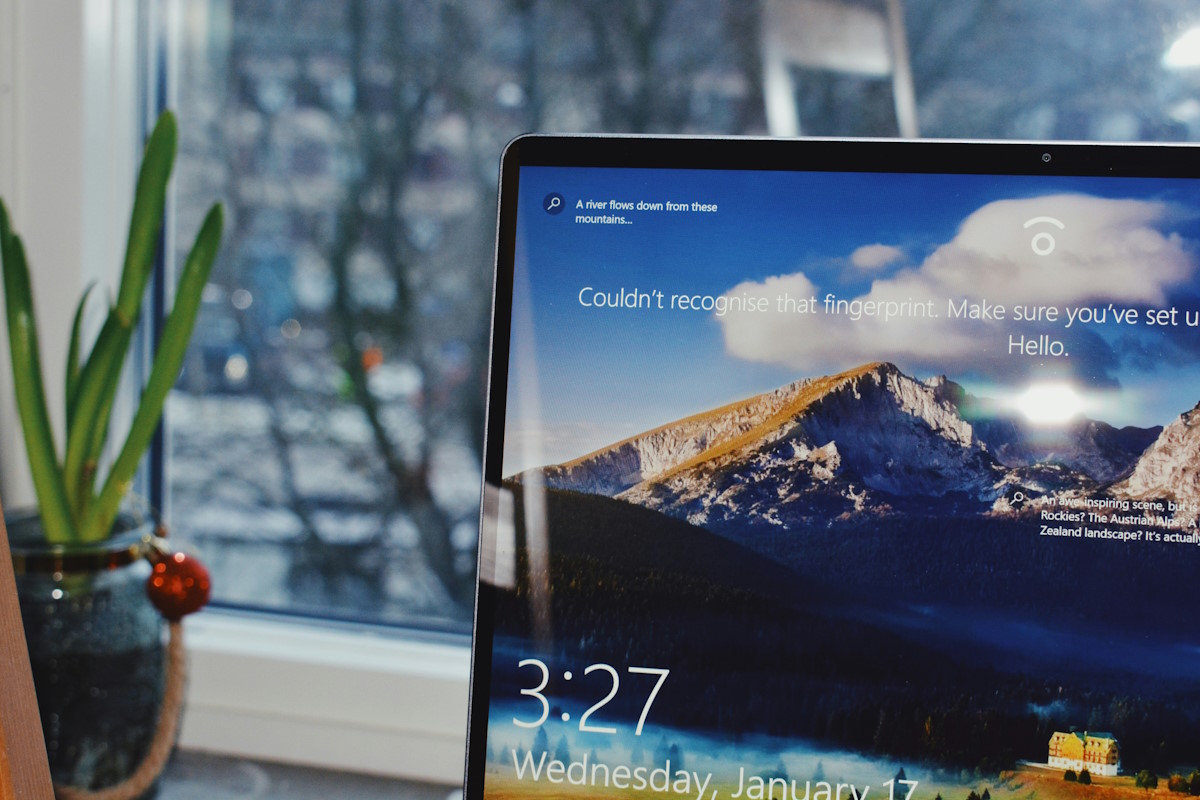Grab your Windows 7 licenses while you can: End of sales begins October 31, 2014

If you are a Windows user who does not like Windows 8 for one reason or the other but decided to buy a new PC, it is likely that you picked Windows 7 as your operating system of choice for it.
But, if you have not picked up a license of Windows 7 yet, then you may want to consider doing so this year as Microsoft has updated its end of sales information page.
When a product reaches end of sales, it is "no longer shipped to retailers or Original Equipment Manufacturers (OEMs)".
While that does not mean that existing copies will get removed, it is likely that it gets difficult to get your hands on a copy as OEMs may not build new products using the operating system once it reaches end of sales.
Microsoft lists October 31, 2014 as the end of sales for Windows 7 Home Basic, Windows 7 Home Premium and Windows 7 Ultimate.
The version missing? Windows 7 Professional. No date has been given yet, but Microsoft noted on the page that it will give one year of notice prior to the end of sales date for that operation system. This means that Windows 7 Professional will continue to be distributed to OEMs and retailers until at least February 2015.

One month prior to that, that is January 13, 2015 to be precise, marks the end of mainstream support for the Windows 7 Service Pack. Extended support on the other hand will be given until January 14, 2020.
The core difference between mainstream and extended support is that Microsoft drops several support related services when mainstream support ends. This includes non-security hotfix support, warranty claims, or design changes and feature requests.
Sales of an older operating system are stopped in retail one year and to OEMs two years after a system's successor is launched. As you may know, Windows 8 was launched in October 2012 which coincides with those end of sales dates.
So what is the reason for Windows 7 Professional's extended end of sales date? The most likely explanation is that the company wants to keep it available to businesses that are preparing or have started to deploy Windows 7 on their infrastructure.
End of sales does not necessarily mean end of availability either. If you check out eBay or Amazon right now, you will notice that older versions of Windows, Windows XP for instance, are offered on those sites.
What it means though is that consumers cannot buy systems with the operating system anymore from OEMs such as Dell or HP, while businesses still can.
The operating systems will continue to be available even after Microsoft's end of sales proclamation. It will become difficult however to buy consumer PCs running Windows 7, so that downgrading from Windows 8.x to Windows 7 is the remaining option for users who do not want to run Windows 8 (besides buying a license on marketplaces such as eBay, Newegg or Amazon that is).
Advertisement

















Martin, is it possible to state today when Windows 7 Home Premium SP1 32 bits will stop receiving updates??? Thank you.
On January 14, 2020, see: http://windows.microsoft.com/en-us/windows/lifecycle
Thank you for answering. Hope to live until 2020!!!
I am using Win Vista. I think when support for that ends I will switch over to Linux Mint.
there will be for sale tens of thousands of perfectly good or refurbished computers that are running win7 operating system. that is always an option for any who wish an option to back up their win7. cost will be only slightly higher than the win7 dvd for a whole computer.
Thanks for the timely warning. I’m not opposed to win8, but I need to continue to be able to operate the software packages I have invested in already.
Wow, the goodwill is palpable on this website. Incredible such people exist and are spreading the feeling to the world.
Its sickening
@MadridKing: I take your comment as sarcasm, and to mean that you feel “goodwill toward Microsoft” is lacking.
That may be so, but a watershed period has arrived. You no longer have to pay for a powerful, secure, user-friendly operating system. Over the past months I’ve installed and run a half-dozen Linux distros: Ubuntu, Zorin, Sabayon, Manjaro, Elementary, and Salix. With the exception of Sabayon, all of them installed faster than Windows 7. All of them installed easily, just as easily as Windows. All of them recognized the hardware on my test machine, and all of them recognized the peripheral devices I had on hand.
If an average home user wants to go online, do word-processing and spreadsheets, keep a calendar or recipe book or whatever, there is no reason he has to pay Microsoft or Apple one penny. Ever. And he can choose just about any interface imaginable, from the traditional menuing system of Zorin, the mobile-button interface of Gnome 3, or an app dock Mac-style desktop.
The world is changing under Microsoft’s feet. There are three major full-featured office suites competing with MS office now — OpenOffice, LibreOffice, and Kingsoft Office. (The latter is more known in Asia, where it is a major player. It offers both free and purchased versions for Windows, Mac, Android, and Linux.) Free, open-source databases already out-compete Sequel Server in many applications. Most internet servers are either BSD or Linux, not Windows.
The point is not hatred of Microsoft — MS is a corporation, a profit-making machine, and one might as well hate a leech for being a leech. But in exactly the same way, goodwill toward Microsoft is just as irrelevant as goodwill toward a leech. A leech is out to suck as much blood as it needs; Microsoft is out to get as much of your money as it can. It’s silly to hate or love either one. But also silly to let them have their way with you. Especially when you have alternatives.
Re’ interested bystander: I’m not an ‘up to speed’ user of computing/computers however, I found your reply refreshing as I did not realise that there are other providers other than MS & Apple. Also the range of Office suites and on top of that, other ISP’s. Thank you for sharing that info’.
Marcus
Another Microsoft’s mistake to raise Windows 8’s lame sales.
The only solution to costumers: P*r*cy
Great to know, I’ll defenetly go for a Windows 7 Pro lincense. I’ve always prefer windows XP but there are not a lot of updates. :)
I bought a new laptop last 8th of February, and it had Win7 Home. I think that’s gonna last me ’til 2020, when, hopefully Win10 will not be a total disaster (or maybe, just maybe, Android becomes the dominant desktop OS).
By that time Windows will be open source ;)
Well, it hasn’t been yet ;)
Very sad news for all Windows 7 users, prospective or not.